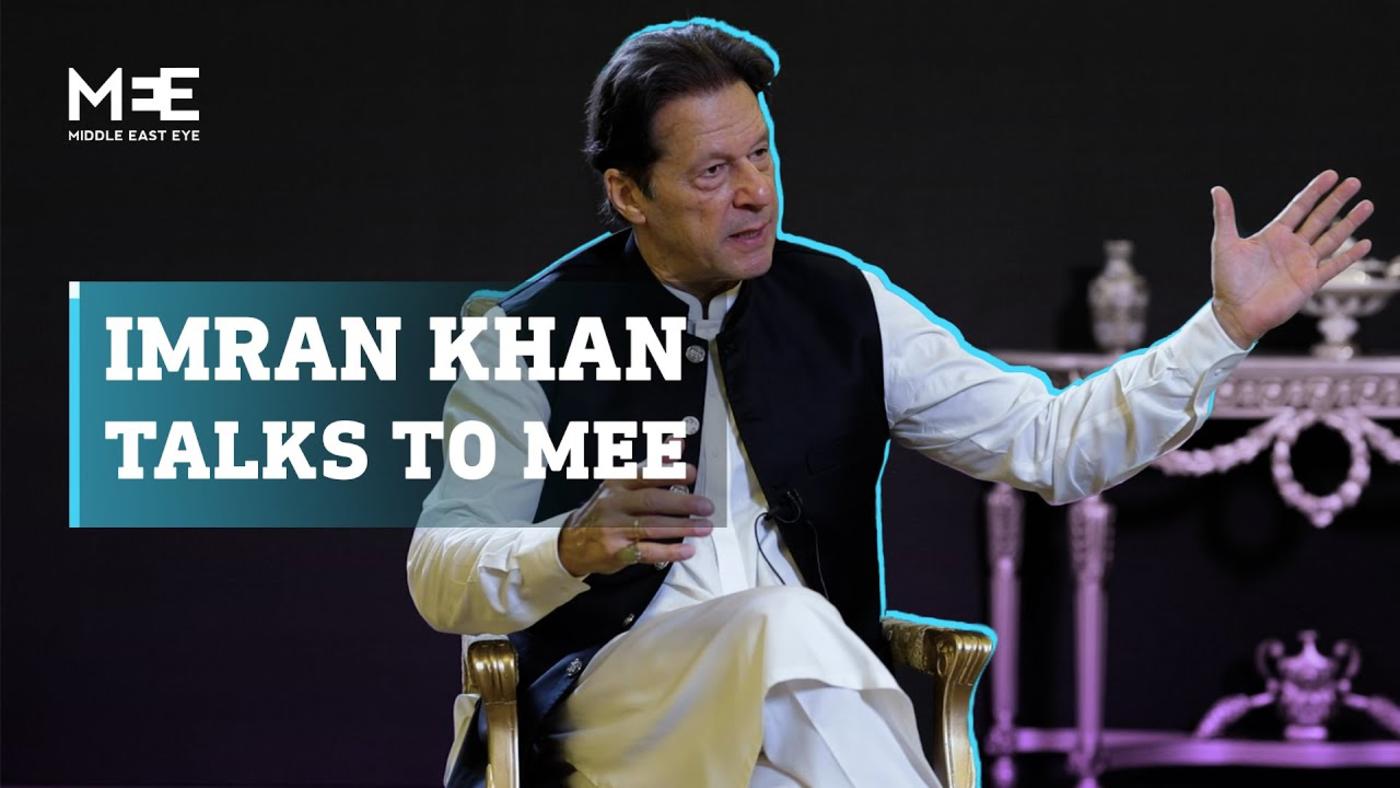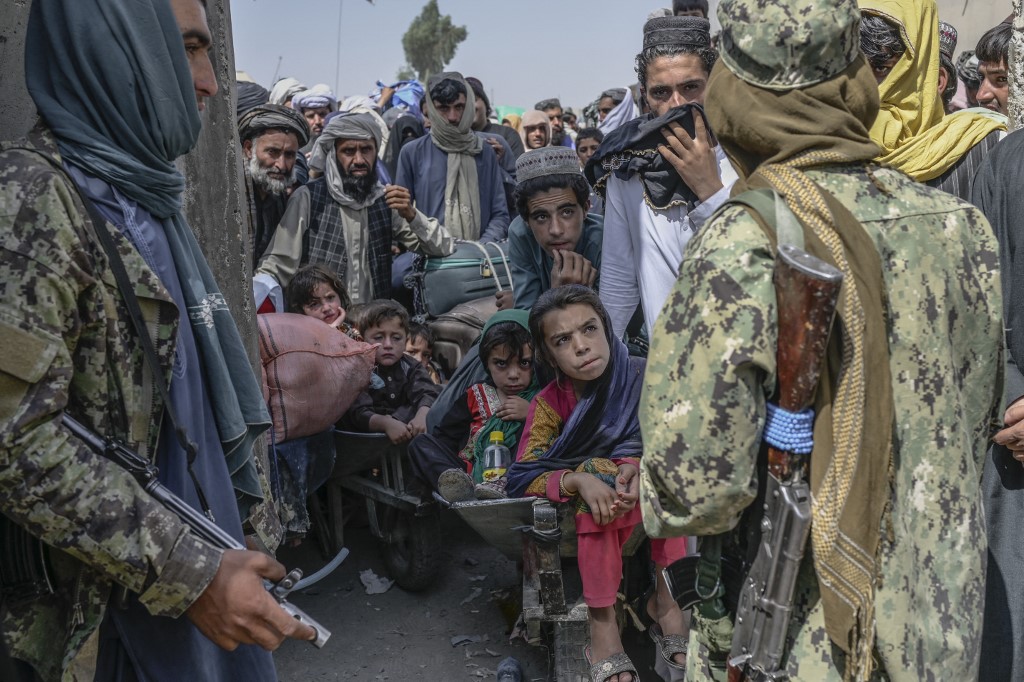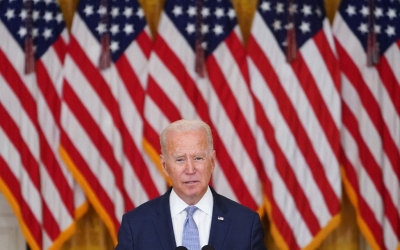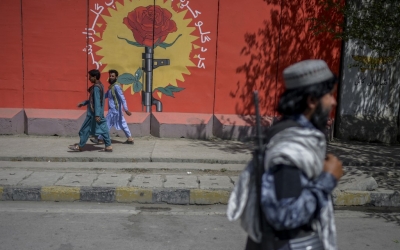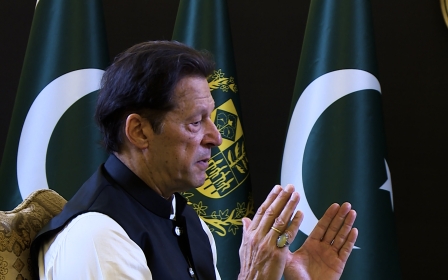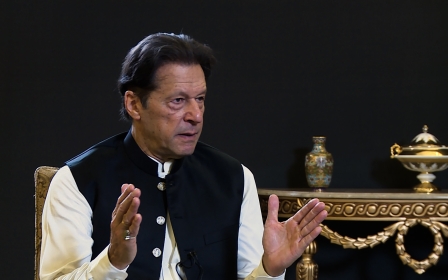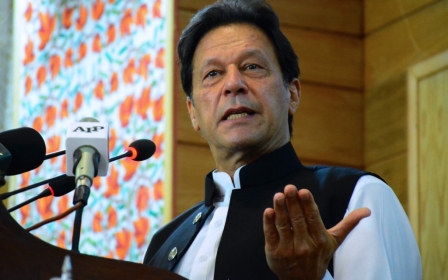Imran Khan: US must engage with Taliban or face chaos
The United States has to “pull itself together” and deliver an aid package to Afghanistan or face the collapse of a country which would become a haven for Islamic State militants, Imran Khan, the prime minister of Pakistan, has told Middle East Eye.
Khan said it was vital to Pakistan that Washington steps up to the challenge because his country, where tens of thousands of people have died in conflict linked to the US-led "war on terror", would once more pay a heavy price.
'Unless America takes the lead, we are worried that there will be chaos in Afghanistan and we will be most affected by that'
- Imran Khan
“It’s a really critical time and the US has to pull itself together because people in the United States are in a state of shock,” he told MEE in an interview in Islamabad.
“They were imagining some sort of democracy, nation-building or liberated women, and suddenly they find the Taliban are back. There is so much anger and shock and surprise. Unless America takes the lead, we are worried that there will be chaos in Afghanistan and we will be most affected by that.”
Khan was speaking on the 20th anniversary of the US invasion of Afghanistan on 7 October 2001 to oust the ruling Taliban in the aftermath of the 11 September attacks by al-Qaeda in New York and Washington DC.
New MEE newsletter: Jerusalem Dispatch
Sign up to get the latest insights and analysis on Israel-Palestine, alongside Turkey Unpacked and other MEE newsletters
Two decades later, Khan said the US had no other option but to do everything it could to support stable government in Afghanistan, because the Taliban was the only option for fighting Islamic State in the region – and to prevent the ascendency of hardline elements within the Taliban's own ranks.
IS's regional affiliate in Afghanistan, known as Islamic State Khorosan Province, has fought against the Taliban and claimed responsibility for a number of recent deadly attacks, including the bombing of a Shia mosque in the northern city of Kunduz on Friday in which dozens were killed.
Khan said: “The world must engage with Afghanistan because if it pushes it away, within the Taliban movement there are hardliners, and it could easily go back to the Taliban of 2000 and that would be a disaster.”
The Taliban is still on the US Treasury sanctions designation list, effectively preventing the group from accessing more than $9bn in US-held assets belonging to the Afghan Central Bank.
Biden 'not listening'
UN special representative to Afghanistan, Deborah Lyons, warned last month that the policy was likely to precipitate “a severe economic downturn that could throw many more millions into poverty and hunger, may generate a massive wave of refugees from Afghanistan, and indeed set Afghanistan back for generations.”
With half the population already below the poverty line, and 75 percent of the national budget dependent on foreign aid, sanctioning the Taliban would soon lead to a humanitarian disaster, Khan said.
'If they leave Afghanistan like this, my worry is that Afghanistan could easily revert back to 1989 when the Soviets and US left and over 200,000 Afghans died in the chaos'
- Imran Khan
“If they leave Afghanistan like this, my worry is that Afghanistan could easily revert back to 1989 when the Soviets and US left and over 200,000 Afghans died in the chaos,” he said, referring to the civil war that followed the Soviet retreat from the country.
Khan was speaking ahead of the arrival in Islamabad of US Deputy Secretary of State Wendy Sherman to meet Pakistani Foreign Minister Shah Mahmood Qureshi.
US State Department spokesperson Ned Price said the two officials discussed "the importance of the U.S.-Pakistan relationship and the way forward in Afghanistan".
"Deputy Secretary Sherman emphasised the importance of a coordinated approach to Afghanistan and other issues vital to regional stability," said Price.
Over the weekend, US officials also held talks with senior Taliban representatives in Doha, Qatar.
"The two sides... discussed the United States’ provision of robust humanitarian assistance, directly to the Afghan people," said Price.
"The discussions were candid and professional with the U.S. delegation reiterating that the Taliban will be judged on its actions, not only its words."
But Khan said Biden was not listening – the two leaders have still not spoken, he revealed.
Khan and Biden are no strangers to each other, however.
Khan told MEE he had warned Biden, John Kerry and Harry Reid – then all senators - in 2008 that they were creating a quagmire in Afghanistan for which there was no military solution. He said they did not listen.
Two years later General Ashfaq Parvez Kayani, then Pakistan’s chief of army staff, delivered the same message to US President Barack Obama.
“But unfortunately, they were led by their generals. And do you know what generals always say: give us more troops and more time.”
Khan was visibly angry when asked about suggestions that he had gloated about the fall of Kabul to the Taliban. Speaking one day after the group took control of the capital, prompting thousands of people to attempt to leave the country, Khan said Afghans had “broken the shackles of slavery”.
He told MEE: “We have been so relieved because we expected a bloodbath but what happened was a peaceful transfer of power. But we also felt we were blamed for this. Three hundred thousand [Afghan army] troops surrendered without a fight, so clearly we did not tell them to surrender.”
Asked whether the Taliban had formed an inclusive government, Khan conceded it was not inclusive, but said the government was a transitional one.
He said he was working with neighbouring states, notably Tajikistan and Uzbekistan, which have sizeable ethnic minorities inside Afghanistan, to encourage the Taliban to widen representation.
“They need an inclusive government because Afghanistan is a diverse society.”
Women's rights rolled back
Khan stressed that the only bar to entry into government applied to members of what he called the “former regime“, which he accused of corruption.
One of the first things Zabiullah Mujahid, the Taliban’s spokesperson, did after the fall of Kabul was to reassure Afghan women that “our sisters and our men have the same rights”.
But Human Rights Watch has accused the group since taking power of “implementing a massive rollback of human rights,” with universities closed, access to healthcare restricted and demonstrators beaten and threatened.
'If you force them [Taliban], I would imagine the nature of the people is such that they will push back and it would be counterproductive'
- Imran Khan
Khan said the Taliban should be given time: “They have made the right statements and have no other option. What else are we going to do if we sanction them? The best way is to incentivise them to walk the talk.
“But if you force them, I would imagine the nature of the people is such that they will push back and it would be counterproductive.”
He said there were clearly different currents within the movement and a lack of clear leadership on some issues.
Pakistan is currently engaged in delicate and politically sensitive negotiations with the Tehrik-e-Taliban Pakistan (TPP), often called the Pakistan Taliban.
The TTP and the Pakistani army have fought their own bloody conflict on the sidelines of the "war on terror", with the loss of more than 80,000 lives.
The TTP, which was driven out of the tribal areas five years ago, has since relaunched its campaign with renewed clashes with the army.
The TTP has made two conditions for a ceasefire – Sharia law in the tribal areas, and the release of prisoners. The Pakistan government insists only the constitution applies to these areas.
Khan told MEE that the TTP consisted of 50 groups and that he was trying to reconcile those elements who were willing to talk.
“Now we are trying to talk to those who can be reconciled because it’s from a position of strength. I always believed all insurgencies eventually end up on the dialogue table, like the IRA [Irish Republican Army] for instance,” he said, referring to the Northern Irish peace deal.
Cost in lives
He said the Taliban government in Afghanistan had told Pakistan that the TTP would not be allowed to launch attacks on Pakistan from inside Afghan territory.
He accused Indian intelligence of supporting these attacks under the former government in Kabul.
'No country paid such a heavy price as us. Eighty thousand Pakistanis died. The economy was devastated'
- Imran Khan
“We now have to talk to those we can reconcile and [persuade to] give up their arms and live as normal citizens.”
Khan condemned the continued use of drones by the US in Afghanistan.
“It is the most insane way of fighting terrorism. Doing a drone attack on a village mud hut and expecting there will not be casualties. And a lot of time the drones targeted the wrong people.”
Asked whether Pakistan would allow the US to launch strikes targeting IS in Afghanistan from Pakistan, Khan said: “They don’t need a base here because we do not need to be part of a conflict again.”
He spoke passionately about the human and financial cost paid by Pakistan since the US-led attack on Afghanistan in 2001 and the country’s own connected conflict.
“No country paid such a heavy price as us. Eighty thousand Pakistanis died. The economy was devastated. $150bn was lost to the economy. It was called the most dangerous place on earth. Three-and-a-half million people were internally displaced.”
Khan said it was too early to say what the regional effect of the US withdrawal would be.
But he said China was the emerging power that would step into the vacuum and had stood by Pakistan – a key recipient of Chinese investment as part of Beijing’s Belt and Road project – during its darkest recent days.
“Who was the country that came to help? We were going belly up. It was China that helped us. You always remember those who help you in the difficult times.”
Middle East Eye delivers independent and unrivalled coverage and analysis of the Middle East, North Africa and beyond. To learn more about republishing this content and the associated fees, please fill out this form. More about MEE can be found here.


